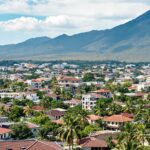A groundbreaking new program that allows Indigenous and Afro-Mexican communities to directly manage federal infrastructure funds without state or municipal government intervention has begun its rollout in Morelos.
President Claudia Sheinbaum delivered 104 million pesos (US $5.5 million) to 82 Indigenous communities in the central Mexican state during a weekend ceremony in Coatetelco. The funds will be managed directly by local assemblies following constitutional reforms enacted in 2024.
The initiative stems from the Social Infrastructure Contribution Fund for Indigenous and Afro-Mexican Peoples (Faispiam), which reserves 10% of Mexico’s federal infrastructure budget for these communities. Depending on population size and marginalization levels, communities will receive between 50,000 and 7 million pesos (US $2,600 to $367,600).
The Program’s Aims and Benefits
The program aims to benefit over 15,200 communities across Mexico, allowing them to fund projects such as:
- Drinking water systems
- Schools
- Housing
- Roads
- Sewage
- Electrification
Communities must hold assemblies to elect oversight committees and determine how funds will be used.
Nationwide Implementation and Potential Impact
Nationwide implementation is already underway, with 344 of 558 planned assemblies completed as of early June. Oaxaca, Chiapas, and Veracruz have the largest number of eligible Indigenous communities.
For travelers interested in Mexico’s Indigenous regions, this initiative may lead to improved infrastructure in communities that are often tourist destinations. The autonomous municipality of Coatetelco, where the ceremony took place, is home to a sacred pre-Hispanic lake and represents one of central Mexico’s few fishing communities.
The program marks a significant shift in how Mexico approaches development in Indigenous territories, potentially creating better facilities and services for both residents and visitors exploring these culturally rich areas.
Source: Mexico News Daily


Leave a Reply